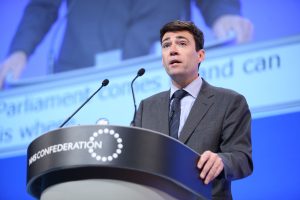On 21 February, William Wragg MP laid an Early Day Motion (EDM) in the House of Commons, declaring no confidence in the Speaker of the House of Commons, Lindsay Hoyle.[1] 94 MPs have now signed the EDM.[2] Understanding why Hoyle’s actions have provoked such rage requires a background understanding of both Parliamentary procedure and political issues.
21 February was an SNP Opposition Day in the House of Commons. Such days are a chance for opposition parties to debate and vote on a motion of their choosing. In this case, the SNP chose to lay a motion before the House of Commons, calling for ‘an immediate ceasefire in Gaza and Israel’ and ‘an end to the collective punishment of the Palestinian people’.[3] The Labour Leadership felt they could not support this motion, particularly the sentiment that Israel is engaged in collective punishment of Palestinians. Instead, Labour laid an amendment to the motion calling for an ‘immediate humanitarian ceasefire’,[4] while the Government laid an amendment calling for ‘negotiations to agree an immediate humanitarian pause’.[5] Since 1979, standard procedure on opposition days is for the original motion (in this case, the SNP’s) to be voted on first, followed by the Government amendment. This is designed to give the opposition party the chance to have a vote on their own motion, on the expectation that the Government’s amendment will always be passed.
However, the Speaker chose to break with precedent on this occasion. He selected the Labour amendment as well as the Government amendment. Hoyle announced that the Labour amendment would be voted on first, then the SNP motion, then the Government amendment, so that the House of Commons ‘is able to consider the widest possible range of options’ given the nature of the Gaza debate, which is ‘a highly sensitive subject, on which feelings are running high’.[6] In protest at this decision, many Conservative and SNP MPs walked out of the Chamber and refused to participate in the debate or vote, while the Government withdrew their amendment. Consequently, the Labour amendment was passed without a vote, and the SNP’s original motion was never voted on.
SNP and Conservative MPs reacted with fury at the Speaker’s intervention. There are several reasons for their anger:
The Speaker’s own explanation of his reasoning was that he wanted to give the House the opportunity to vote on as wide a range of options as possible, so that MPs could more explicitly represent their view to the public. This is particularly pertinent on the Gaza issue, as the divisive nature of the debate has left some MPs, particularly Labour MPs, feeling in danger. While this may be the case, many MPs were outraged that the Speaker would give in to intimidation and change the way the Commons operates based on threats of violence, whether implicit or explicit. Such complaints were raised in the Commons by MPs including Sir Charles Walker[7] and Kit Malthouse.[8]
There is an alternative explanation of the Speaker’s reason for changing procedure, which is that Labour may have threatened the Speaker with the loss of his job if he did not change procedure to protect the Labour Party from embarrassment and division. Speakers are elected by a majority of MPs in the House of Commons and it is possible Labour wins a majority at the next election. This explanation was raised by Conservative MP Philip Davies in the Commons, citing a tweet by the political editor of Newsnight.[9] Before the Speaker’s intervention, Labour MPs were undoubtedly in a difficult position, unable to support the SNP motion, as it is against Labour policy and may alienate more moderate voters, while abstaining would allow the SNP or other opposition parties to accuse them of supporting Israel’s military actions. If this interpretation of events is credible, then anger from the Conservative and SNP benches would be understandable given the decision favoured Labour.
Finally, the SNP have a genuine grievance with relation to their opposition day itself. These days are meant to allow the opposition parties to debate and vote on a motion of their choosing, giving them a platform in a legislature which can often be dominated by the governing party. In breaking with precedent, the Speaker started a chain of events which meant the SNP did not get that chance. Indeed, on many other occasions, the Government has been embarrassed or put in a difficult position by an opposition day, and Government MPs’ votes on these issues have aroused anger from their constituents. That is a feature, not a flaw, of Parliamentary procedure, and both the Conservatives and SNP have cause to be angry with the Speaker given that he has seemingly taken sides, and protected the Labour Party from embarrassment, whatever his reasons for doing so.
BREVIA CONSULTING PROVIDES STRAIGHTFORWARD POLITICAL ADVICE AND SUPPORT TO BUSINESSES AND ORGANISATIONS
Discover how Brevia can help you and your organisation by contacting the Brevia Team on 020 7091 1650 or contact@brevia.co.uk
[1] House of Commons, Early Day Motion 412: No confidence in the Speaker, 21 February 2024, link
[2] Ibid
[3] House of Commons, Order Paper No.50: Part 1, 21 February 2024, p.5, link
[4] House of Commons, Order Paper No.50: Part 1, 21 February 2024, p.7, link
[5] Ibid
[6] Mr Speaker, Hansard, 21 February 2024, Col.723, link
[7] Sir Charles Walker, Hansard, 21 February 2024, Col.801, link



